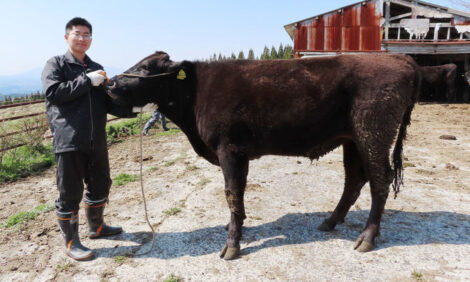



Horse Meat Scandal Has Global Repercussions
ANALYSIS - Repercussions surrounding the contamination of beef products and ready meals with horse meat have spread across Europe and around the world, writes Chris Harris.Food safety authorities in European countries are now vigorously testing further processed beef products for the presence of horse meat, following the discovery of the contamination in Findus and Nestlé meals.
And this week, Fernando Sampaio, (pictured), the executive director of the Brazilian beef export association, Abiec, warned that the fraud discovered in Europe could harm beef sales on foreign markets.
.He said that although the fraud in the sale of frozen horse meat might appear to be an internal problem for Europe, the consequences could be much broader.
Abiec is studying what the losses could be for the Brazilian product.
Mr Sampaio said the image of the beef has been immediately affected.
"A scandal like this, regardless of the type of meat, affects consumption in general. People get suspicious with meat consumption and low enough," he said.
"It affects the image of the sector and a reduction in consumption happens naturally."
He added that one of the motives for the fraud is the price of beef.
However, the crisis could also impact exports to countries such as Russia, where the veterinary authorties have voiced concerns over the handling of the issue.
Rosselkhoznador said it has applied to the Directorate General of the European Commission for Health and Consumer Protection with a request to provide it with the information concerning the investigation.
It has also expressed its concern about the existing problems in the control system of the regulated product movement in the EU and in the shipment of products for export.
Rosselkhoznadzor said that such cases do not favour the increase of the trust to the guarantees provided by the Veterinary Services in EU member countries.
"All these recent cases testify to a serious vulnerability of the European animal product safety system and to its inability to prevent the entrance of products of an unknown, dangerous or doubtful origin into food chain," Rosselkhoznador said.
In Europe, the European Commission has adopted a Recommendation for an EU coordinated plan on controls to investigate fraudulent practices and to enhance consumer.
In Europe, the European Commission has adopted a Recommendation for an EU coordinated plan on controls to investigate fraudulent practices and to enhance consumer.
The EU will grant financial support to Member States which carry out this plan at a rate of 75 per cent.
The controls are to start immediately, running for one month and may be extended for a further two months.
The plan includes two actions:
- Establishment of the presence of unlabelled horse meat in food: Over the last days, official controls in some Member States revealed fraud in the marketing of foods. Certain foods contained horse meat that was not declared in the list of ingredients and their description referred solely to the presence of beef. The plan, foresees controls, mainly at retail level, of foods destined for the final consumer and marketed as containing beef, to detect the presence of unlabelled horse meat (indicative total number of 2250 samples across the EU ranging from 10 to 150 per Member State). Under current EU rules, it is considered misleading and in breach of legislation to suggest the presence of beef meat where, in fact, other types of meat are also present. In the same way, labelling of food containing horse meat is not in line with EU food labelling legislation, if the presence of horse meat is not listed in the ingredients.
- Detection of possible residues of phenylbutazone in horse meat: the plan foresees the testing of 1 sample for every 50 tonnes of horse meat. A Member State will carry out a minimum of 5 tests. Phenylbutazone is a veterinary medicinal product whose use in food producing animals, including horses, is illegal. The plan provides for regular reporting of the results of the controls to the Commission, such as information on sampling, type of analysis and follow-up controls. For positive findings of residues in phenylbutazone in horse meat, information on the country where the animals concerned were certified for slaughter will also be included in the report. Member States have to submit their first report on 15 April 2013. If the testing proves positive however, Member States must report the findings immediately. All this information will be included in the Rapid Alert System for Food and Feed (RASFF) so that they can be immediately used by Member States' authorities.
The European Commission action has prompted food safety organisations in all European Union countries into action with a concerted programme of testing.
In Finland, the food safety authority Evira said: "All operators in the food chain are in their part responsible for ensuring that foodstuffs comply with required standards and are safe. Food packaging must bear statutory labelling with details of the composition of the food, as well as other information. If the food contains meat, the list of ingredients must specify the species of the meat.
"Evira is preparing to examine foodstuffs by taking spot checks in order to establish whether or not products contain horse meat labelled as beef.
"A sampling plan is currently being prepared, under which Evira will instruct municipal controlling authorities to take samples from foods in different parts of Finland."
In Sweden, the safety authority said the aim of the sampling is to quickly identify how widespread cheating by horse and pork are products on the Swedish market.
"The survey is for products featuring beef as an ingredient. - Consumers must be able to trust the label. We want to quickly get a picture of how widespread horse and pork cheating is on the Swedish market. Sampling is done in all the big chain stores and as many brands as possible," said Jan Sjögren, head of Livsmedelsverkett.
In Germany, Consumer Protection Minister Ilse Aigner said: "The authorities responsible for food inspection in the country and the federal government are acting together decisively. We will pull together to cover the cases as soon as possible to clarify the situation and to create transparency and improve consumer protection."
In France, following the suspension of health approval for the meat processor Spanghero Castelnaudary, the Minister of Agriculture, Food and Forestry, Stéphane Le Foll, has allowed the processor to resume some activities at the plant.
The move follows inspection of the processes in the plant and will allow production of minced meat and sausage products. However, part of the storage area has still been closed off.
The Government said that the conclusions of health checks, required under this regulation which provides that "food should be properly labeled to facilitate its traceability," are completely separate from investigations by the Directorate General for Competition, Consumption and Fraud Control (DGCCRF) of economic deception.
In Austria, two products had been found to be implicated in the mislabelling scandal including week beef tortelloni the Liechtenstein company Hilconas, which was sold under the brand Gusto and "Combino Penne Bolognese, both sold by Lidl.
Currently 80 products are being inspected in Austria and to date just one more has been found to contain horse meat.
"We demand the reliability of food throughout Europe," said Chancellor Werner Faymann.
"I hope the horse-meat discussion leads to awakening. Origins and ingredients of the food must be for the consumers clear what is on it, must be in there too."
Agriculture Minister Nikolaus Berlakovich repeated his call for a "passport for food " to give a "clear indication of origin".
In Italy, president of the agricultural union Confagricoltura , Mario Guidi said: "Horse meat is not bad, in fact it is good and is recommended in some diseases. It is rich in iron. But consumers have a right to know what they are consuming and if it meets their needs and desires.
"If you declare on the label that it is beef and instead of horse, it is a fraud on the market."
However, in Ireland there has been a back lash from some retailers casting doubt on the veracity of the testing.
This week the Food Safety Authority of Ireland hit back.
It said: "Attempts to cast doubt on the veracity and robustness of the DNA testing carried on its behalf by a number of laboratories is disingenuous, dishonest and untruthful. It states that some small segment of the retail sector is seeking to undermine the actual results in an attempt to distance themselves from the scientifically sound results which have implications for their product.
"The FSAI confirms that for its survey on equine DNA in beef products, it employed the services of two internationally recognised laboratories - Identigen in Dublin and Eurofins Laboratories in Germany. Following the detection of equine DNA in burgers by Identigen, for the sake of certainty, 20 sub-samples (10 positives and 10 negatives) from the initial 27 burger survey samples were taken from the Identigen laboratory and sent as blind samples to the Eurofins laboratory in Germany for additional independent testing. The tests by Eurofins confirmed both the positive and negative findings by Identigen."



